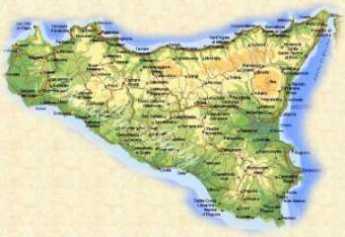Related Topics
Outlaws: Crime in Philadelphia
Even the criminals, the courts and the prisons of this town have a Philadelphia distinctiveness. The underworld has its own version of history.
Philadelphia Politics
Originally, politics had to do with the Proprietors, then the immigrants, then the King of England, then the establishment of the nation. Philadelphia first perfected the big-city political machine, which centers on bulk payments from utilities to the boss politician rather than small graft payments to individual office holders. More efficient that way.
Philadelphia Legal Scene
The American legal profession grew up in this town, creating institutions and traditions that set the style for everyone else. Boston, New York and Washington have lots of influential lawyers, but Philadelphia shapes the legal profession.
Customs, Culture and Traditions
Abundant seafood made it easy to settle here. Agriculture takes longer.
Mussolini in South Philadelphia

|
| Sicily |
The western tip of Sicily is as mountainous and remote from the heart of Europe as the Hebrides in Scotland. Like the Highland Scots, the western Sicilians ran their own informal government out of sight and out of reach. Even the Church in that region of Sicily had a sense of kinship to Eastern Orthodoxy rather than to Roman hierarchy. The flavor of the local culture can be sampled in Tomasi di Lampedusa's classic novel The Leopard which, among other things, helps explain why so many Italians hated Garibaldi, mostly known to the rest of us as Italy's great unifier. Mussolini was in the same class.
At the time of the great Italian immigration early in the Twentieth century, Italy was in near-chaos. Benito Mussolini presented himself as a welcome strongman who put down crime and disorder, particularly Communist disorder and made the trains run on time. Most of his efforts took place in the urban centers of Italy, paying little attention to rural regions like the far tip of Sicily until rather late in his rule. Meanwhile, western Sicily had its own traditional medieval way of maintaining order. The Mafiosi contained elements of the old feudal nobility, following secret activities similar in ceremony and brutality to the southern American Ku Klux Klan. Most of the inhabitant families had been living in the same villages for centuries, and by intermarriage had become very cohesive. They knew who was who, and who could be trusted. Secrecy, omerta, was their rule, murder a regrettable tradition. In this way, the stable community protected itself against roving brigands, local psychopaths, and thieving government officials. There were competitive bands who needed to be warned against; the "Black Hand" was a notorious group of local extortionists who employed dynamite as their signature. Although murder and mysterious disappearance were common enough, the Mafia had their official secret nobility, and murders were not condoned unless they were authorized by the legitimized but secret nobles. It was this secret competitive government that Mussolini decided to stamp out.
Meanwhile, back in Philadelphia clusters of immigrants from the same immigrant groups formed organizations based along the same lines. Every wave of immigrants from whatever country has always brought a crime wave with them to America, prison records document these immigrant waves, and most of the victims of each crime wave are almost always fellow immigrants. In the case of the Italians, the organizations were already in existence. For a while, the Black Hand terrorized the slums. And then the Mafiosi got themselves together, steadily eliminating trouble makers but only after a certain amount of due process authorizing the rubouts as justified. As has been true of every immigrant wave, the police were not trusted to see that justice was done, and gradually withdrew to let the informal government govern in the neighborhoods. The established American government would certainly not tolerate a rival nation within its borders, but rendering unto Caesar was moderately tolerable. Soldiers were appointed to an ununiformed militia, the victimized immigrants were coerced to contribute to the cost of their own protection, just like taxation in the more open community. The original and most enduring source of revenue for the Mafiosi was the one that was traditional back home in Sicily -- paid protection.
So when this group learned that back home Mussolini was waging war against the Mafia, the ties of loyalty to Italy were readily severed. Fascism, whatever that strange word meant, was a bad thing. Maybe the American government wasn't so bad, even when there was a war against Italy.
Originally published: Tuesday, January 02, 2007; most-recently modified: Friday, May 24, 2019
| Posted by: Vincenzo | Mar 29, 2008 12:40 PM |
I have reciprocated with a link to yours on our Linking Partners page.
Dr. Fisher
| Posted by: Dr Fisher Replies | Feb 9, 2007 8:29 AM |
http://bootsontheground1918.blogspot.com/
| Posted by: [none] | Feb 8, 2007 4:03 PM |